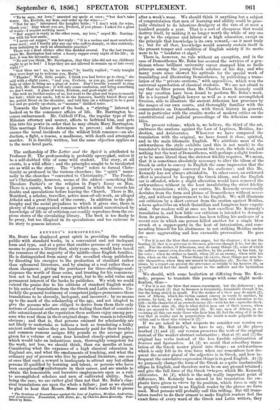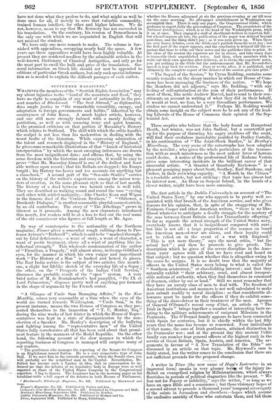KENNEDY'S DEMOSTHENES.*
Mn. Boffin has displayed great spirit in providing the reading public with standard works, in a convenient and not inelegant form and type, and at a price that enables persons of very scanty means to possess a library that, sixty years ago, would have taxed the resources of the majority of the middle-class English families. He is distinguished from many of the so-called cheap publishers by directing his energies to the production of standard rather than ephemeral literature, and by aiming at a real rather than a sham cheapness ; giving the .purchaser for three-shillings-and- sixpence the worth of those coins, and trusting for his remunera- tion not to bad paper and worse print, but to the solid value and permanent interest of the books he publishes. We wish we could extend the praise due to his editions of standard English works to his series of translations from the Greek and Latin classics. Un- luckily the general testimony of competent judges pronounces these translations to be slovenly, inelegant, and incorrect ; by no means up to the mark of the scholarship of the age, and not adapted to give the persons who are obliged to derive from them their only notions of classical authors any other feeling than that of consider- able astonishment at the reputation these authors enjoy among per- sons who read them in their original shape. One reason is tolerably obvious ; and that is, that persons eminent for scholarship are not likely to undertake so tedious a task as translating a bulky ancient author unless they are handsomely paid for their trouble ; and common rumour assigns fifty pounds as the average price given for a volume of some four hundred closely-printed pages, which would take an industrious man, thoroughly competent for the work, not less, we should think, than six months at least. Considering what ihe expenses of a high classical education in England are, and what the emoluments of teaching, and what the ordinary pay of persons who live by periodical literature, one sees at once that such a reward is inadequate to attract any but either persons ill qualified by learning and talent, or persons who have been exe,eptionall'unfortunate in their career, and are unable to obtain the honourable and lucrative employments open as a rule to accomplished scholars and men of cultivated ability. Such being the ease, we are rather glad than not that Mr. Bohn's clas- sical translations are upon the whole a failure ; just as we should be glad to hear that Messrs. Moses and Son's coats fell to pieces • The Orations of Demosthenes against the Law of Leptines, Meidias, Atadrotion, and Aristoerates. Translated, with Notes, 4-e., by Charles Bann Kennedy. Pub- fished by Bohn.
after a week's wear. We should think it anything but a subject of congratulation that men of learning and ability could be gene- rally obtained to do laborious drudgery at the rate of at most a hundred pounds a year. That is a sort of cheapness that would destroy itself, by making it no longer worth the while of any one to go to the expense and labour of a high education, except on the principle that knowledge is its own reward,---as it most truly is ; but for all that, knowledge would scarcely sustain itself in the present temper and condition of English society if its motto were to be " laudatur et alget."
There is, however, no rule without an exception, and in the case of Demosthenes Mr. Bohn has secured the services of a gen- tleman whose brilliant university career stamped him as facile princeps among the. young Greek scholars of his day, and who many years since showed his aptitude for the special work of translating and illustrating Demosthenes, by publishing a trans- lation of the " private orations," with appendices, which won the universal approbation of classical students. We are not afraid to say that no fitter person than Mr. Charles Rann Kennedy could by any exertion have been found to perform Mr. Bohn's work. He is a learned. English lawyer as well as a most accomplished Grecian, able to illustrate the ancient Athenian law processes by the usages of our own courts, and thoroughly familiar with the commentators on Demosthenes, with Greek history in general, and in particular with the erudite works of modern critics on the constitutional and, judicial proceedings of the Athenian assem- blies.
The present volume, which is, we believe, the third of the set, embraces the orations against the Law of feptines, Meidias, An- drotion, and Aristocrates. Wherever we have compared the translation with the original, we have found it close, spirited, and in the main idiomatic English. We attribute most of the awkwardness the style exhibits (and this is not much) to the translator's determination to present the text, the whole text, and nothing but the text of Demosthenes, with perhaps a slight tenden- cy to be more literal than the strictest fidelity requires. We mean, that it is sometimes absolutely necessary to alter the idiom of the Greek in order to convey in English the same impression that the orator's own language conveyed to his audience ; and this Mr. Kennedy has not always attended to. In other cases, an awkward effect is produced by Steeping the Greek idiom, and the English ear is offended, where a slight alteration would have removed the awkwardness without in the least invalidating the strict fidelity of the translation • while, per contra, Mr. Kennedy occasionally deviates from the form and phrase of Demosthenes without neces- sity, and without improvement to his English. We will illustrate our criticism by a short extract from the oration against Meidias, a locus splendidus on which Quintilian and Longinus have expati- ,ated. Our readers will at once see how excellent Mr. Kennedy's translation is, and how little our criticism is intended to derogate from its praises. Demosthenes has been telling his audience of a recent case in which one person killed another for a single blow struck at a supper-party in the heat of intoxication, and com- mending himself for his abstinence in not striking Meidias under far more aggravating and less excusable provocation. He goes
011—
" For it is not the blow that causes anger, but the disgrace ; it is not the beating (1) that is so grievous to freemen, grievous though it be, but the in- sult. For the striker, 0 Athenians may do many things (2), some of which the sufferer cannot even describe to, another, by his gesture, by his look, by his voice ; when he strikes to insult, when (3) as an enemy, when with his fists, when on the cheek. These things (4) excite= these things put men be- side themselves, when they are unused to indignities (5). No one, 0 Athe- nians by a report can present the grievance so vividly to his hearers (6), as in truth and in fact the insult appears to the sufferer and the bystanders
(7)." We should, with some hesitation at differing from Mr. Ken-
nedy, propose to translate this passage with some slight modi-
fication, thus-
" For it is not the blow that rouses resentment, but the dishonour ; not the being struck (1) that to freemen is formidable, formidable though it be, but the being struck in insult. For the striker of a blow may do much (2), men of Athens, which his victim cannot convey in words to another, by gesture, by look, by voice, when he strikes the blow with intention to in- sult—in the character of an avowed enemy (3)—with his fist—upon the cheek: This is what stirs (4), this is what drives men out of their senses, when they are unused to be vilely treated (5). No one, men of Athens, in re- counting all this can make those who hear him (6) feel the sting of it in the way that in reality and in perpetration the insult is made palpable to the victim and to those who witness it (7)."
If we are asked in what respects we consider our version su-
perior to Mr. Kennedy's, we have to say, that at the places marked (1) and (5) our version preserves the verb of the original instead of the weaker abstract substantive ; that at (6) and (7) the original has verbs instead of the less forcible substantives of hearers and bystanders. At (2) we avoid that schoolboy trans- lation of the Greek neuter plural into things ; an awkwardness which is only felt in its true force when one remembers how fre- quent the neuter plural of the adjective is in Greek, and how in- frequent the correlative expression things is in good English. At (3) we purposely change the form of the Greek as a quite inadmissible ellipse in English, and therefore not to be on any ground retained ; and give the full force of the Greek inr4exow, which Mr. Kennedy obliterates. At j4), which is the only really important point of difference, Mr. Kennedy has missed in his translation the em- phatic force given to •ravra by its position, which force is only to be properly conveyed to an English reader by the phrase we have used. Most persons will probably call this trifling. But till trans- lators resolve to do their utmost to make English readers feel the exact force of every word of the Greek and Latin writers, they
have not done what they profess to do, and what might as well be done once for all, if merely to save that valuable commodity, trained human intellect, for other and higher labours. We do not, however, mean to say that Mr. Kennedy has not succeeded in his translation. On the contrary, his version of Demosthenes is the only one with which we are acquainted in English that will not mislead the student.
We have only one more remark to make. The volume is fur- nished with appendices, occupying nearly half the space. A few years ago these appendices would have been highly valuable. At present they are rendered needless by the admirable articles in the well-known Dictionary of Classical Antiquities, and only go for the most part to swell the bulk and price of the translation. Ge- neral information on Greek life should not now be appended to editions of particular Greek authors, but only such special informa- tion as is needed to explain the difficult passages of each author.



































 Previous page
Previous page